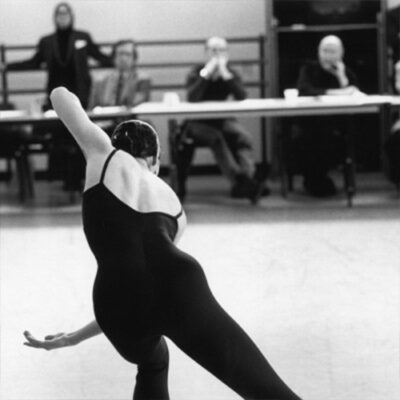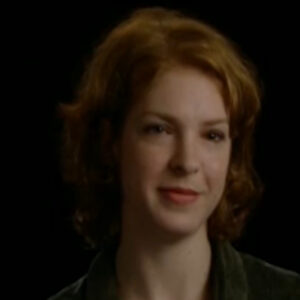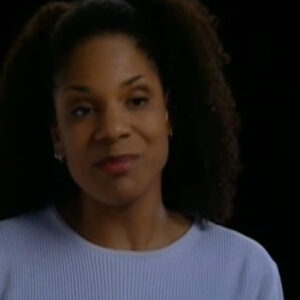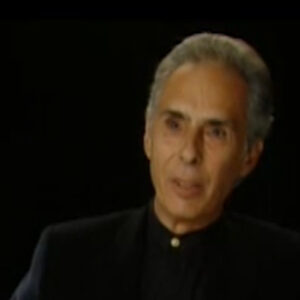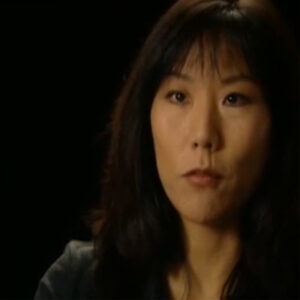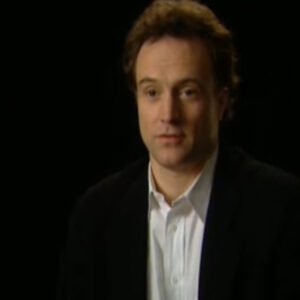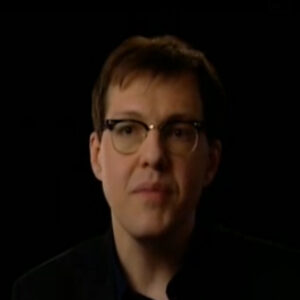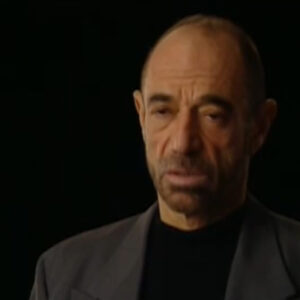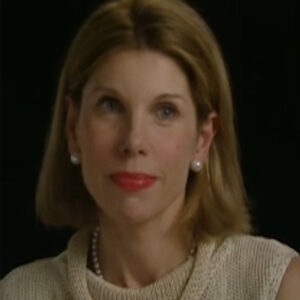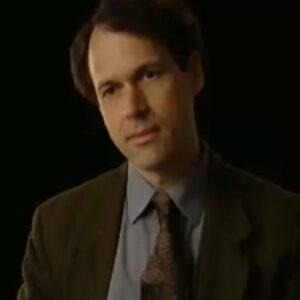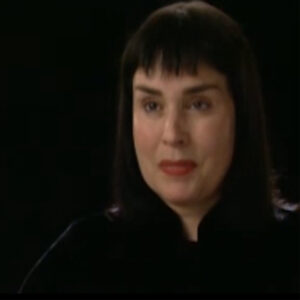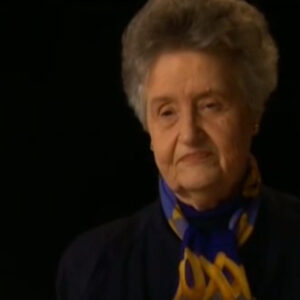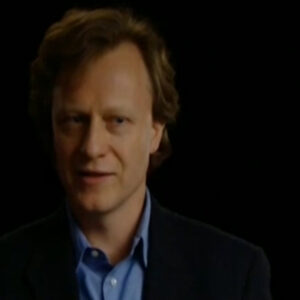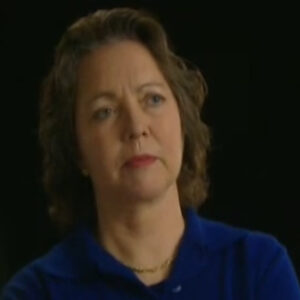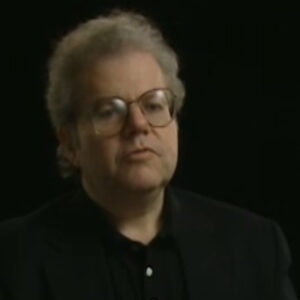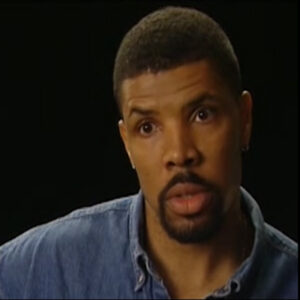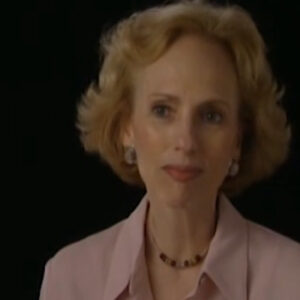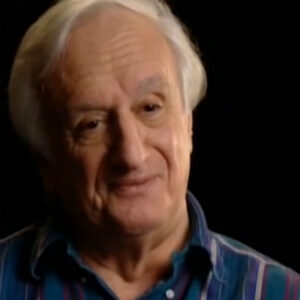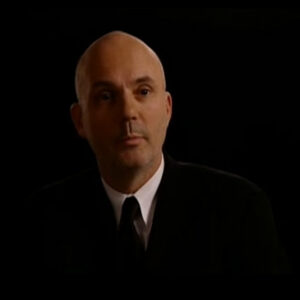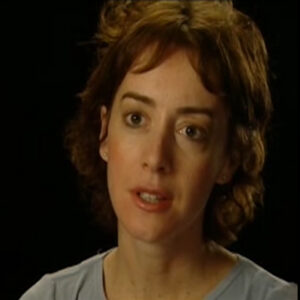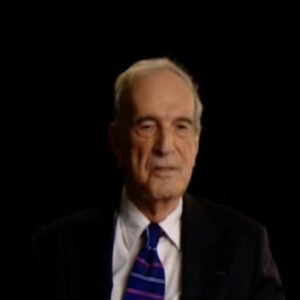Speaker I well, I, I was always involved in the theater. My father’s a playwright and I grew up with a heavy theatrical influence. STOCKARD or household, the Eshkol household, I guess. And I started backstage and doing summer stock, and it took me a while to actually get up the courage to get on stage. I was a little shy about that and but I did slowly did plays in high school. And then I went to college and I was a theater arts major in college. And when I was. When it became time to make a decision of whether or not to try and work professionally or go to a training program, I know that it was very clear to me that what I needed was to go to school. I had I had been to the theater a lot. I went to a theater all the time with with my family and on my own. It was an active theatregoer.
Speaker And I noticed that there would be these wonderful ingenues who had watch over a period of time and they’d be so good and so alive and so emotional. And then they’d get to a certain age and they’d kind of dry out and you could see that they just didn’t know how to help themselves get to the next phase. Of their work and not in a lifetime. Being in the theater, you can tell they just sort of the resources ran out.
Speaker And I wanted to make sure that that didn’t happen to me because I knew that I was a creative person. I knew that I had good instincts.
Speaker I knew that I loved the theater and that I you know, that it was clear that that’s where I wanted my life to be. But I thank God I was instinctive enough to know that I needed to be trained so that I could learn how to help myself. As the years rolled by and so Juilliard of there were four there were about five programs that were really sort of hot when I was in college that everyone sort of looked to. And Juilliard was my last choice, actually. I had heard terrible things about the school. I had heard that it was snobby and elitist. I had heard that it was they called the jail yard. I had heard it was, you know, that you go and you become a robot. And and I was interested in other programs, actually, but I applied just to get as many auditions under my belt as I could and sort of use it as my warm up audition for the other schools.
Speaker And oddly enough, I went and I remember seeing you think, well, wait a minute, this is this doesn’t feel so bad here. You know, it doesn’t feels like a school and it feels a little institutional and all of that. But, you know, the students who were the monitors who were helping us through the audition process were really nice, genuinely nice. And the audition process, though, terrifying. And really, you just want to vomit the whole time you’re going through it. Everyone was there was a good atmosphere there. It was active. It was alive. It felt good. And oddly enough, the other schools that I went to that I sort of had my sights on, I didn’t like it there. I just the atmosphere just it just didn’t feel right for me. And when you when you look to go to a drama school, they’re all good. They all are really good. And they offer very specific things.
Speaker And I was just lucky that Juilliard accepted me because it was the right program for me. It’s not right for everybody. But I was really, really lucky. So I had I was wrong about all my preconceived notions about the school. I was right about some of them. It’s tough and it’s really hard. And you give up your life for four years. But but it has a great heart.
Speaker The school really has a good heart to stop.
Speaker But we’re going to keep I’m ready.
Speaker Talk to me a little bit about the audition. The auditions have never, never even had a print person. And Michael, let me through the whole audition. That’s amazing things. The actual auditions, what I called the cosy conversations upstairs for those who are or the next level. And it was amazing. I mean, really, unbelievably, some very cocky and confident. I thought, God.
Speaker Wow. Wow. Tell me what that was.
Speaker Tell me a little bit. Tell me what you did and what. You’re right. What it was like.
Speaker Well, I was at Brown University and there were a bunch of us who were auditioning during the same day. It was my birthday, actually. And there was myself in there was Tim Nelson and Wil Sparks and we were all at Brown together. So we traveled down and I auditioned in the morning and I think they were auditioning in the afternoon. I think that’s what it was. And I had a piece from Shivery, which was my modern piece, my contemporary monologue about a belly dancer.
Speaker I did her mind from Winter’s Tale very badly because I really didn’t know what I was doing.
Speaker But you go you’re you’re in the building. I had just sort of told myself, you know, I’m not going to get in here. I’m not going to get in here. So just have the experience and see how you audition and try and learn from it. And I had done a really good job of myself psychologically. I got there luckily, because you can go in and just be terrified. I got there. There are so many people. There’s so many people at these auditions. And I remember I was the first one to go. I was the second audition of the first day of auditions of that series. I think they do New York to Chicago. I think maybe Miami, the West Coast. And they took me to a hallway and I sat there were two chairs. There was me and the girl who went in before me, and she had a wig stand off with a wig on.
Speaker It’s just sort of sitting. I just thought, oh, God.
Speaker And she went and she came out. And then I went in and it was very much like Flashdance. There’s a table and there are three teachers who are there who you don’t know who they are at the time. But for me, I think it was Robert Williams, Liz Smith and John Sticks and Harold Stone. I think that’s what Ben and I did my pieces. I said thank you very much. And they said, thank you very much. And I left the room and your adrenaline starts to go. And you just you think, oh, I made it through without completely messing up.
Speaker And then you wait. And then what they do is they post a list on the wall with the names of those people who are being called back for the afternoon. And I remember sort of waiting and waiting and and someone came down and they posted the list. I think there were four names on the list and there were a lot of people there and people were just just swarmed that bulletin board. And I slowly walked up and my name was. And I remember I made absolutely no reaction at all. Because I felt bad for everyone who was standing around me, who clearly their names weren’t on the list. And. So I’m thinking, that’s my name. My name is up there and I just sort of turned away and I went to it to a hallway and I found my friend with me. I said my name, actually. So then I had to wait until 5:00 that afternoon for a callback. So you wait. You wait. It’s a very surreal day. And they have you go in a room and they have you. Right. I think they had this right. An event that changed a significant event in our lives, a recent significant event. I thought, oh, God, you know what significant event? And I you know, I was thinking, what do you write about the death of someone, the birth of someone? I was trying to think monumental. And I thought, well, no, you know. And I had gotten a letter I’d received a letter from a friend of mine the day before from someone who I hadn’t heard from in a long time. And just how nice that was. So I did that. Then they call you and then you go into the actual theater where the entire faculty is assembled. And you go and you do your pieces and you’ve been told are you sort of hear through the grapevine of everyone else who’s auditioning that once you go through your callback, they usually put you through a rigorous improv thing. They make you improvise some event or or some something. So I finished my two pieces and I remember it was Michael Kahn stood up and said, well, so does anyone need to say anything? And there was definitely some. And they said, thank you very much, Laura. Thank you very much. And I think I was. There was no improv. And I remember and they didn’t ask me to sing a song. They didn’t they didn’t ask me to do anything. They just said thank you. And so I said thanks. And I remember thinking I loved that theater so much. The space that that theater in the school is so lovely. And it felt so good. And I remember just thing. Oh, God, I hope I get to come back here. I hope I get to do something here because it just felt good. The place just felt right to me. But I really didn’t think I was going to get. And then a few weeks later, I got a letter and and actually my other two friends who I went to college with also got. So the three of us all went together, which was great. So all three. Mm hmm. Yes. With all of this. Yes. It was very unusual. It was extremely unusual.
Speaker And we all got to. In a in.
Speaker What do you want to talk a little bit about?
Speaker I know that you you know that even though they were before your time, a little bit about, you know, housemen.
Speaker And John has been an Santoni in the philosophy building program. What?
Speaker What do you what is this old free classical training Bible, which vanity Bible, which I’ve read? Yeah, yeah, it has. There is a sort of mystique and people who don’t who haven’t been through a training program or don’t really know much about it, why would they unless they they’ve been through it themselves. There is I think when someone was making fun of me the other day saying, you know, Alora, when people talk about the program, the Juilliard program, I mean, it sounds like a cult. It’s like really, well, obnoxious. That sounds in the program. And it’s a school. It’s a training school. You go and you learn things.
Speaker The thing that’s so great about Juilliard is that it is the philosophy of the education there is based on Michelle Sundanese work of how to put a school together for the theater. And it’s a four year program and the four year sort of dovetail into each other. And they build upon each other in a way that you don’t appreciate until you get out. And then you can look back on and go, oh, wow, how smart they were, how smart they were to put that class in the second year and then this one in the third. And you don’t and you’re not aware of it while you’re there. But how what care is put into the sequence of events that you go through while you’re there? The faculty is amazing. And there’s a lot of work that they do that the students are never aware of as far as making sure that your time there is well spent and that things come in a sequential order, that they move you through an education in the most effective way possible.
Speaker You know, it being specific about this order that you’re thinking, you know what? What are you referring to? What do you think comes secondary can handle when you get what. Right. Happening?
Speaker Well, they’re the acting classes. That’s the basic thing. And the movement class and the voice, I mean, it’s just sort of goes on and on and on. But you can’t skip steps.
Speaker I mean, they make sure that you learn how not to skip steps.
Speaker So that you start with very basic things, which can be very frustrating for a young actor who really thinks that they’re ready to go. And I’m going to school and I’m going to do Shakespeare and I’m going to do it really well. And they will do it really well.
Speaker But you.
Speaker You have to sort of know what all of your options are so that you don’t just quickly jump to choices that might not be as interesting if you just know if you have more resources available to you. So there’s John Starks was the first year you do a lot of work on improving, sort of getting your imagination going and realizes what what you learn, what choices are more effective than others. And you learn a lot of things. That’s just a basic thing you learn. You know how to listen and you learn about yourself. You learn where your strengths and weaknesses are so that you can sort of pay attention to those things and, you know, with voice. It starts with literally breathing, learning how to breathe. And it sounds ridiculous, but learning how to breathe in the most effective way possible and in a way that liberates you as opposed to a way of shutting you down. I think a lot of people feel that when you go to a training school that you get shackled and and and you feel things are imposed upon you. And it’s the exact opposite is the intention in order to free you up and to let your, you know, let you use it. You know, all the resources that you have available to you both yourself and your body and your voice and your imagination, your mind and your emotions. And then also learning how to do research and things like that. But the school is. Really smart about when you take a certain class, what teacher enters your life at a certain time? And it’s one of the things that I admire most about the school.
Speaker Talk a little bit about. Yeah, I was just just scoot over, scoot over. You suffering with whoever is upstairs? Chinese. Do you know we’re following some sort of group?
Speaker Thirty. Thirty. God. Thirty group. Thirty. Thirty. I was.
Speaker I was nineteen thirties.
Speaker Shaw a classic here. Juilliard moved me. You wanted you spend a little bit of time with the third year. Yeah. I’m wondering your thoughts on that. Thirty year. Why did I get you know, I mean I sort of know now but I guess I’m not. You know what. What is that or what’s going on in that.
Speaker There’s thirty or there’s north. There’s an enormous amount going on. And I completely lost it. My third year, third year was my year of fear and anxiety and panic and paralysis and my sense of humor. Took a vacation and went to San Juan. And I was.
Speaker Oh, 30 years hard. You’ve learned so much. And you’re you’re little. You’re saturated with with with new information about yourself and what you can do and everything that’s available to you. And your body’s been retrained and your voice has been retrained. And then you’ve learned how to look at text in a different way and you’ve learned how to work with your fellow students in a certain way. And and you sort of. It’s different for everybody. But for me, I just sort of I didn’t know what to do. I felt like I couldn’t walk and talk at the same time. I just hit that wall and it was ungodly painful, ungodly painful.
Speaker And it’s not an unusual thing to happen. It happens usually to everyone at one point while they’re there. And for me, it was third year. For me, it was Shaw was did we did a production of Heartbreak House. And I had stage fright for the first time in my life. I had panic attacks. I was bursting into flop sweats. I got on stage and I wanted to go home.
Speaker When I was onstage, I would look at my sweet, wonderful classmates and just be thinking about what I had for lunch that day, as opposed to me saying I was just overwhelmed, completely overwhelmed with everything that I have learned and with a sort of understanding that I had to take a step forward and I was really scared. And fortunately. I somehow worked through it, but I thought about leaving when I thought about. I had such self-doubt at that point thinking, you know, everyone’s been very nice to me for all these years and they’ve been supportive, but I can’t do this. And who am I kidding?
Speaker And they made a mistake when they accepted me. And I should just leave. But I was and I laugh about it now. But at the time, it was no fun.
Speaker And I was able to sort of work through it and. But third year, you are just. You don’t know where to turn.
Speaker You’re just you’ve saturated so much. And it just hasn’t absorbed yet. So you just feel like you’re sort of outer body. You can’t quite function the way you know you want to and can’t function.
Speaker It’s growing pains. That’s what it is. It’s intense growing pains.
Speaker Did you suffer the way? I think the biggest thing that I see in this, especially the young fellow that we’re following, is intense suffering about casting and not so much casting as I’m not getting the part, but casting as can I carry a play? If it’s somewhere, it’s like, do they like me, but also do I like myself if I don’t get this? I don’t care. Well, I walked out of here not knowing if I can carry a play. And so the casting enters a million levels. It’s favoritism. It’s what’s going on here. And I hear it a lot. I mean, I seen up to those boards. Now, whatever Class 19 can reflect and say the auditions a daily thing, the casting of the day. But do you recall that that kind of burden and anxiety or did you just have good casting? You didn’t have to suffer in that way.
Speaker My class was unusually large. We had 10 women, which is very a huge number for any class. So our casting was fairly well rotated. They couldn’t just favor one or two people because there were so many others there that really it was pretty good. There were a few people who who probably should have. Well, I’m sure would have liked to have had larger roles while they were there, but I was always pretty good. About realizing that I was in school and that and I was learning so much in the Klatt in the classrooms. That I was OK with whatever casting I had because there was so much that I could apply from class to those shows that we did, that it was really OK with me. And you’re an ensemble. You’re there as an ensemble. It’s an important thing to learn. You’re not always gonna get the big part. It’s not always gonna happen. It will happen, but not always. And so for me, it didn’t it didn’t bother me all that much. I remember hearing a lot about it, not so much with my class, but with with other classes. And you’re anxious to know where you are. I think what the casting anxiety is, is wanting an opportunity to apply all that stuff and then be able to sort of, um. I don’t know.
Speaker I feel like I’ve gotten better or I haven’t or I’m good or I’m not or it’s validation. You want to know sort of where you are. Has this is this training helping me? Am I better now? Am I better?
Speaker And more likely than not, they’re not going to be better. You’re not gonna feel like you really know what the hell you’re doing until you’ve been out of school for a while. But because the school is so intense and because you’re there so many hours a day and the only people you ever see for four years are your classmates and your teachers casting all that becomes overly important. And I completely sympathize and understand the anxieties around it. But there’s so much to do to waste your time on that as it’s just gonna it’s just gonna be such a burden.
Speaker I understand the frustration, but there’s a lot there to do. And it’s not just about the show’s.
Speaker Did you talk a little bit about that group, the group together, coming together to stay together? Yeah.
Speaker Yeah, and there’s a kind of a trust there’s that, as I call it. It’s like you’re both naked in front of everybody in front of the class. Oh, yeah. Your class. Yeah. In front of the faculty. Yeah. A little bit about the I sort of because there’s no narration in the film. Tell me. Hi. Come in. In your group. You stay together. Yeah.
Speaker You arrive at school and you’re thrown into what you know is gonna be an ensemble for four years. You don’t know each other. You’re from all over the country. I think I was the only person from Manhattan. I was the only person from New York City in my class other than maybe other one other person. And everyone was from all over the place. We all had vastly different backgrounds. We varied in age from people who were right out of high school, to people who had been out of college for a while and.
Speaker You guys spent a lot of time with these people. You’re going to get to know them really, really well.
Speaker And even scarier, they’re going to get to know you really well. So I was very lucky. I had a great class. I loved my class. We fought and we went through periods of time of hating each other and loving each other. And, you know, that all ebbs and flows as as time goes on. But you’re profoundly bonded. I mean, I am bonded to a group of people who I might not see them for years, but.
Speaker They’re a classmate of mine. And your feelings towards them are very, very strong and, you know, most of us are our friends for life. And whenever you get on the phone with someone else from your class, it’s like, have you heard from so-and-so? And what are they doing and where are they and how are they and what’s going on? And there’s there’s the jealousies and the love affairs and the bickering and the friendships and the friendships that fall apart and the friendships to come back together. It’s it’s an enormous thing for a lot for a group of people to go to go through. And you’re there. You can be extremely supportive.
Speaker And really, my class was so talented. I, I love more than anything sitting in those classrooms and watching my classmates work.
Speaker I you know, those acting classes were thrilling and watching people take a step forward or break through something, you know, break down a wall that they’d been pounding on for a long time or, you know, watching them grow and develop and get stronger and feel better about themselves. And it was remarkable. It was really incredible. And I miss those rooms. I find that. I miss. I miss that kind of concentration. I miss that pure concentration that has nothing to do with the business or growing older or how much money I’m making or rent or family or or anything like that.
Speaker It is it is a really pure time. And you become completely dependent on. This ensemble that you’re thrown into, the hardest day for me was the day we had leagues, which is which is these big auditions at the end of your fourth year for the business sort of comes in and take takes a look at the students who are graduating. And it’s the first time when you’re not an ensemble anymore. And that was hard for me. And I love being a part of a group. And I had a great class. I had a great class. But for those people who don’t have a good class, that’s hard. That’s really hard. If you don’t get along, if people really don’t like each other and are not willing to work together. Death, misery, pain.
Speaker Be no fun.
Speaker Yeah. Later tonight.
Speaker Oh, my God. Oh, my God. The league’s. Just no fun for a variety of reasons. You’re you don’t know what. You have no idea, or at least I certainly didn’t. I had no what was out there. I had just figured out how to be a good student. I had just figured out how to work in that school. And. And I began to appreciate it. The more I was there, the more and more I appreciated that the faculty and the student of my classmates and all the Negro Leagues and you hear that casting directors are coming and that, you know, agents are coming and you don’t really understand what all that is, really. And you have an idea. You don’t really know. And they all come and they have their pieces of paper. And you do these scenes that you’ve prepared and you’re so nervous and you just want to vomit and you’re doing your scene. You hear people right. Writing down names, you hear them making note, your pencil scratching on paper. And then when I was there, they would take each person, say, if casting director comes, I’d write a list of however many people they wanted to interview afterwards on the piece paper. And they. So each casting director or agent would hands all those sheets into the school in the school with and post them on the wall. And we’d have to walk down the wall with our own little piece of paper and pencil and see who was interested in meeting with us. Some people you will always have a few students who are on absolutely every shape, every shape. And then for me, I bombed out. Leagues. Leagues was a disaster for me.
Speaker I’m actually the I’m the bad league poster child. Julie Harris. I’m the one they point to and say, look, if you bomb out at leagues, it doesn’t mean, you know, your life is over. Look at Laura Linney because I’m just so badly at leagues. I chose the wrong scenes.
Speaker I wasn’t good in them. I didn’t really understand the importance of the of the day.
Speaker And I think I had three calls, three out of like 100 or something. And. And that’s just you just the day becomes overly important. You think I’ve worked for years so hard and I get three calls. And fortunately, it you know, for me, it wasn’t as important as I felt it was at the time. But leagues are go God.
Speaker You just you know, you have three minutes to sort of introduce yourself to the business. And it’s impossible. It’s just awful.
Speaker Do you think that a lot of what belief really is in the end is she looks like she looks to Spanish? I mean, is it is it is it as brutal as the businesses itself? In a way?
Speaker I don’t know the most important thing out of leagues is, is it is an introduction to being able to talk to people about the next sort of phase of your life, getting an agent.
Speaker What is that all about? Learning how to audition? Advice that you can get from these people, you know, and hopefully the right match is made between student and agent.
Speaker And then and then it goes on from there. But it is brutal.
Speaker It’s pretty brutal and it’s brutal and a completely different way than school was brutal. So you’re going from one kind of brutality are scheduled from the minute you get there from eight o’clock in the morning until late, late at night. And I sort of thought of myself as someone who knew how to go to school. I really thought I you know, I knew how to do this. I can do this. I’ve never been so tired in my life as I was those first six weeks, and I didn’t think I’d make it through. My body, my mind. I was exhausted and it took a while. It took like the first six months to learn how to go there, to learn how to be there. But, boy, are you tired. You’re so tired.
Speaker It’s almost like getting over, it’s almost like you’re going to be there when you realize, you know, I’m not going to be there. I’m not going to be anywhere else. The most you’re the kind of sell yourself.
Speaker Yeah. You have to give over to it. And you also have to let yourself be bad. It’s OK to be bad. It’s important to be bad. During my third year where I had such a terrible time and I was in a production of Heartbreak House, I was horrible. I was really bad. And I knew it. It was so painful that I thought about leaving school at one point. And John sticks. God bless them. Took me aside and said, you’re supposed to be bad here. This is where you’re supposed to be bad. You learn when you’re bad. And he was right. There is a pressure that you feel to be good all the time because it’s the entertainment industry, because you’re learning, you know, because you want to be good. And and the most important one of the most important things you learn there is to let yourself just.
Speaker Stink. And then let it grow from there. But boys, that that’s hard.
Speaker What do you when you like, going back to that, to the leagues a little bit when you leave? You know, not everybody. There’s sort of two things that I wanted to touch on any one. When you went out to the world, when you began to go meet an agent or begin as castings, what was the you know, they they scroll down your resume, they see you. They are like, where? Where do you think? I mean, one. What do you think? The Juilliard Association just for you. Good and bad.
Speaker Well. People have such.
Speaker Different responses to that when they see that you went to Juilliard. And it depends upon their own.
Speaker You know, their own preconceived notions of the school. So some people will we’ll take it and we’ll be overly important. Oh my gosh. What’s Juilliard? And they’ll they’ll make it be too much. Other people will have a real snotty attitude about it, like, oh, well, you went to Juilliard. OK. Prove it. Like, if you’re so good. It’s weird. People respond very strangely to it.
Speaker In L.A., no one cares. I mean, you know what? They don’t care the theater. They don’t care. I mean, they some people do the important. The people who I like and care and appreciate it. I think to some people it means a lot. Others it means nothing.
Speaker I. You know, what do you get you get. You get many, many different reactions to it. I remember for a while not telling people. Because other actors would get weirder or stranger odd about it.
Speaker And then the business, because the business now is. It’s so difficult to have a career just in the theater that you, by necessity and curiosity, you end up, you know, working in TV and film.
Speaker That’s such a different world. And it becomes just a part of you as the more you get away from school as as you’re as you’re out of it.
Speaker Year after year after year, they get the importance of it, which is is profound. But it it takes an appropriate place in your life for a while. That’s all you can think about. That’s all you are. You’re Julia. You’re just you are a student. And then as the years roll by, it becomes it has a very nice, significant place. But it’s not everything that you are.
Speaker Do you think in some ways, as you’re saying, that it’s kind of making me think of Mirin? For me, the idea of what it is to be trained. I mean, Kevin Kline said never apologize for knowing what you’re doing. Yeah, but there in a sense, you got to know what you’re doing and that got to become part of you.
Speaker Yeah, I was harking back to that moment. So, yeah, the same thing in a way. Yeah.
Speaker I mean, do you find when you’re doing roles or, you know, running up a hillside in the Congo or where they are trained in to these movie roles. I mean, it’s.
Speaker Well.
Speaker It with film it, you know it. It helps with a lot of things. It helps with just a.
Speaker It is basic acting, just good old basic acting things which will help you no matter where you are. It helps in dealing with in script work, which can be extremely difficult because a lot of films aren’t really scripted.
Speaker So you have to have a basic understanding of dramatic form or what will work and what won’t work.
Speaker You know, it’s it’s such a huge part of who I am that I, you know, I it’s hard for me to even pinpoint it now. Like what? What is directly from Juilliard and what is just me, I don’t even know how to.
Speaker Think about that.
Speaker Endurance, more than anything else, I think it helps you with a sense of endurance. It’s hopefully you’ll be working for a long, long time. And. It’ll it’ll keep you going as far as knowing how to help yourself in situations where you don’t know what to do with, there’s no one to turn to. And in a sense of thinking, you know, OK, I know what I’m doing. I can do this. I can do this.
Speaker It helped me that way, knowing that I was as prepared as I could possibly be, that I would know how to help myself out if I got in a jam and that I would continue to enjoy it more than anything.
Speaker It’s about having a reservoir of creativity that doesn’t desert you so that when the business is tough and hard and painful, you still are connected in a visceral way to what you do and that you still enjoy it. And it still is fulfilling.
Speaker What do you think in terms of your own work from the from the point that you came there feeling like. All right. I want to be able to have a career longevity. I want to be have some really hard some training. What do you think changed the most about you? You’re working over the four years that you were there. From when you went in. And whatever that potential is, whenever they saw out of two thousand people that they didn’t even know, they you know, what is it about that?
Speaker And what do you think that, you know, as you ask through the misery of the third year. Right. Went into the showcases. Right. What what really proved about you? What was that? What was it?
Speaker If I move now, I think I’m.
Speaker I started to like myself more while I was at school. That’s sort of a personal thing, but. I think it was so rigorous and everything about it was so intense and I did OK, I did OK there. I was OK there. And it gave me a sense of.
Speaker If who I was that I didn’t have before I went there. And I learned how to work with people and listen and figure out what was right for me and not right for me and what would help me and what wouldn’t. And. And it gave me at, I think, a sense of courage that I didn’t have before. I was a little cautious.
Speaker Still, I’m slightly cautious, but it it it just taught me a lot.
Speaker On so many levels, you know, not just, you know, acting wise, but personally and. So I I think I just became a little bolder as far as, you know, going with certain choices and.
Speaker I think I don’t know. You’d have to ask my teachers. I did. You know, I certainly. I spoke to Monique. We had lunch. Love Modi.
Speaker Modi said, oh, my God. You believe she’s a girl? She. Laura Linney. Laura Linney has it.
Speaker Deep in nerd life. That’s what he said. You know, people he’s what he’s most engaged about are the people who do a flip on him, who do it, who did, who come in. And he says, I’ve got them.
Speaker I figured them out. Right. And then I see what they are. Right.
Speaker And you get the twist. Twist for him. Do you see that? Did you. Do you struggle with that a lot, even in and being out there? People think you’re one thing you have to show.
Speaker In what in what do you mean and what kind of circumstances would.
Speaker Well, it’s a lot about that’s just about casting and what you look like in people’s first impressions and then and then realizing that maybe there’s more there than than they realize. I mean, I don’t know. I mean, I’m.
Speaker Was it a struggle for you?
Speaker Now, to see the people you went to school with who haven’t had the careers that they’ve wanted. Sure.
Speaker I mean that for me, you know, that camaraderie, the split of that career broderie maybe you’re saying the first day of that leaks.
Speaker That’s hard.
Speaker I mean, how have how have you. Have you been able to work with professionally the people that you were around at that time?
Speaker Actually not. I don’t think any of us have actually worked together.
Speaker I don’t think I’ve I’ve worked with anyone and I’m still close to a huge number of them. And one thing that people don’t realize is that it’s so wrong to think this, that if you if you don’t if you get out of Juilliard as as an acting student and you don’t hit it and you don’t become a that you’re a failure. Just so wrong. Just wrong, wrong, wrong, wrong. It might not be what you wanted. It might not be what people wanted for you. But I’ve seen so many people, people were in my class and not in my class who have gone on into other professions. And they’re so good at what they do. And I, I know that what they learned at Juilliard is helping them there. I mean, it it helps you in it, in not just being an actor, but an all and a lot of other things there. I have classmates who were working in creative fields. I have classmates who are thinking about going to law school, who are you know, they’ve gone on to other areas.
Speaker But I know that it’s not like it was a waste. Certainly not a waste.
Speaker Do you think that there’s such a thing as the Juilliard actor? This is horrible. I think it’s I mean, I’m wondering. Yes, it’s certainly the thing that people it’s the biggest criticism that you’ll hear outside. Oh, yeah. That voice.
Speaker That’s the voice, the voice and the speech. Yeah. You get that a lot. You hear that a lot.
Speaker And what do you what’s the sort of rumor that you’ve heard about?
Speaker Well, the people what you learn there as far as voice and speech is concerned, it’s hard to learn and it’s hard to incorporate it so that it sounds completely natural. And for some people, it takes longer than others. So you hear a lot about, you know, the robot voice or the Juilliard voice or or whatever.
Speaker And the thing that’s great, though, is that they can do it and then they could not do it and.
Speaker It’s nice to have the option. It’s great to have the option that you can you can use the things you’ve learned at Juilliard or not, but you have them there at your disposal. You have the technique. That’s what technique is. You have it there if you want to use it. You don’t have to, but it’s there. And when you need it, it’s there. And that’s great. As opposed to feel like you have to fake something, you don’t really know what you’re doing or do.
Speaker And that’s nice.
Speaker And what is that? I mean, you know, the sort of more specific. What what is it? It’s speaking clearly. What would you say you started for?
Speaker All right. Well, you just just to break it all down. You’re talking about the production of The Voice. You’re talking about the actual breathing you’re talking about. And then how the air from your lungs comes up and hits your vocal cords. And then how the sound moves out of your mouth and if it hits your hard palate or your soft palate. And then there’s the actual diction then. So there’s an awful lot. And it feels extremely unnatural when you first learn it. And then it can sound extreme, natural for a long time until and until it sort of becomes a deeper part of you.
Speaker But I’m so glad I have it.
Speaker I’m so glad that you know, that I can sound a million different ways if I want to or if I need to or if it’s and that it doesn’t frighten me that if a part comes my way and they say accent or this or that, or if it’s restoration or if it’s verse or if it’s some weird, rhythmic, poetic piece, it doesn’t scare me. It makes me eager to do it because I know I’ll have to do something different. And that’s great.
Speaker So because we don’t have that. I mean, like people probably can’t even comprehend Shakespeare text. I mean, you’re also going into that whole rhyme.
Speaker Yeah. And you know what? And it’s.
Speaker He knows what Juilliard has to offer. It is is fantastic. It’s not for everybody. And just because, you know, there are so many actors I know who have not had a stitch of training and they’re fantastic. They’re fantastic. It just sort of depends on what you want. I guess.
Speaker And what what gets you excited about doing what you do?
Speaker I mean, everyone can get very precious about being trained or being not trained. And it’s it’s it’s fantastic. And it was certainly right for me. But I mean, there are a gazillion good actors who’ve never stepped foot in a classroom. So it’s just it’s a choice. That’s just one it’s one choice.
Speaker Do you think the competitive nature of the business today is an unbelievable gift to get to know you’re going to get one?
Speaker Yeah, probably. Yeah. Yeah, that’s true. It it does.
Speaker The cachet is helpful. Yeah. Unfortunately, I mean.
Speaker And the other thing, the one thing I wanted to talk about, I mean, you talked about leaving in your third year and so forth, thinking about it for long haul.
Speaker A lot of people get cut. A lot of people leave voluntarily. A long list of people that, you know, will happily talk about. Now, as you know, the great graduate are right. People who who left the word graduate is not.
Speaker Yes.
Speaker Let me talk about the sort of two different elements. One, the sort of the cutting process, how that affects. As a group, I get off work.
Speaker I mean, how did how did that work? I mean, did you did you live there in fear? Did you? Sure. How was it presented to you when you went there? That could even happen. How did they talk?
Speaker Yeah. When when I was at school. When I was there at the end of your second year. Cuts from it. Warnings were given out before the Christmas holiday. Ho, ho, ho, ho.
Speaker Merry Christmas. You’d go up and one by one you’d go into whoever was running.
Speaker Michael was Michael Langham. When I was there, you’d go into his office and they talk to you about your work to date. And then when I put you on warning or not, I was not put on morning, I somehow avoided that one.
Speaker But they did warn a few people in my class and then they ended up cutting a few as well. And that’s hard. It’s really hard. It’s hard on an ensemble when you cut people and. And I think the school tries to do it. I have to believe that they try to do it. For the right reasons. But it’s a painful process. It’s really hard.
Speaker I think they’re far more civilized about it now than than when I was there. And before I was there, I was sure I heard it was even worse.
Speaker Had stuff. Not fun. You have a lot of. I mean, did you talk about some of your.
Speaker Oh, I did. Oh, I did. I absolutely. I was giving yourself over to.
Speaker I was completely aware when I was there that I was surrounded by these amazing eccentric.
Speaker Incredible teachers who had also all been working together for a long time. So they’re their own ensemble, that crowd. They’re their own little cast of characters.
Speaker And they’re extremely good about giving cross information to each other, you know? And they’re very good about pointing out what you might need to work on in someone else’s class. So the communication is very good between the faculty, at least when I was there. And I did give over to them and there were some teachers who were tough on me. Hard, hard, hard. And then you learn the painful lesson that, you know, I don’t have to like them and they don’t have to like me for me to learn. That’s a great lesson. That’s a great lesson. If you can learn that early. That it’s hard and it’s painful. When you’re young, you want to be liked by everybody and you want your teachers to see something special and you want them to appreciate your work. But that’s a great thing to learn because you’re not going to get along with everybody. And there are going to be people who don’t like you for God knows what reason. But you God, you can learn from those people. Oh, my God.
Speaker So in a way, the truth, the school. I mean, schools are in the building. The students. That’s talk a little bit about about Michael and about which one.
Speaker Michael. Oh, Michael. I guess I should say Milang of years now. Right. Right. I know. But I think we talked you mentioned to me that that year of acting with him was just about work, the whole. Yeah, absolutely. Absolutely. It’s hard to say. I mean, I see it. Mm hmm. And I’m there.
Speaker But there’s a subtle it. As we’ve been filming in his acting classes, what your thoughts were about him, what you’ve done, that sort of Shakespeare semester that we’re going into right now.
Speaker Third, your show is a Shakespeare show with it. Not when I was there.
Speaker Not not during my generation.
Speaker Yeah. Collins class is. It was for me. You know, fantastic. Because you’re you’re. It used to was your third year then. And everything is sort of coming together and you’re able to use everything. And he knows what you know. He knows that you’ve had this class. This class. This class in this class. And he’s gonna make you use it all. And he’s gonna make it all come together. And it was thrilling. He’s a great acting teacher. He’s great. But he also comes to you at a time when you’re ready to go to sort of take a leap. But you’ve been prepared for that class by John Sticks in the first year by Eve Shapiro in second year. So it’s he gets a lot of credit and he deserves it. But it’s also it’s been leading up to that. People been preparing you for for that year and specifically also the fourth year. I had a my third and fourth year and it was the fourth year that was really exciting, cause you just you have a better sense of yourself and you know how to work.
Speaker So he was just great as far as.
Speaker Because he knew us all individually so well. And he’s so great with text. And it was just thrilling. And, you know, there are things that I that I learned from him that I still remind myself of, you know? Don’t skip steps. I mean, I think about that all the time. I check myself on that all the time when I’m working. Don’t skip steps. Because it’s so easy to do that. And I see people doing it all the time. And I feel at myself when I do it.
Speaker And what do you mean exactly? I mean.
Speaker Don’t stop asking why. Until you can ask why anymore.
Speaker Don’t assume. Don’t assume really figure it out or don’t stop working until. It all comes into play.
Speaker You know, for an example, someone and this is very basic. So here’s like, you know, the sort of idiot version of this. You enter a room in a scene. So I enter the room. What’s and I’m not thinking anything. What did I skip? I skipped what just came before me. I skipped what the weather’s like. I skipped, you know, just information that will inform the next step. So you have to sort of. Just it’s like it’s like being a good detective. And I love that kind of work. It’s just sort of figuring it all out so that you have just much more to play with. And it helps you. It sort of helps you through a scene. And consequently, you you’re able to sort of hook into the action of the scene as opposed to just the emotion of a scene.
Speaker Did you have a lot of memories of.
Speaker Specific performance. Did something. Yeah. Yeah, sure. Yeah.
Speaker Fourth year. We did a production of Top Girls and my class was read a lot of women in my class. And so they picked for us. One of our four shows in rap was Talk Girls, which is great for us. And it was really good. It was just really good. And everyone was so good in it. And. You know, it’s one of those special experiences that really.
Speaker You know, I’ll never I’ll never forget that that show, because everyone was just so good.
Speaker And we were so young and everyone looked so good.
Speaker And everyone was just, you know, it was all coming together. And that was just great.
Speaker And then they’re the ones that are awful, the ones that you don’t forget, the ones that you just you just want to throw yourself off a bridge afterwards cause you think you’re the worst actress ever and you’re never going to work on those shows that you do. They’re really sort of encapsulate a period of time and they become the marker. Of part of your history of the shore. I remember the shore the shore played then represents that entire period of time. You know, it’s and it’s fun to think to think that way.
Speaker Do you think that when you’re when you’re out?
Speaker Thinking about the experience that you expected it to be, right? And what would it really became for you? Do you feel that your. Do you think you’re you’re you’re pretty much on the mark about what you going to get?
Speaker Yeah, I was I was pretty good about that. I knew I had a. I knew that it was gonna be really hard and I knew there was a lot about it that I didn’t know and didn’t understand and wouldn’t know until I got there. I did not go to Juilliard expecting to be crowned with laurels and told how wonderful I was. I really knew that it was gonna be hard. And I wanted to be pushed. I wanted to. Be spoken to honestly and directly about what I needed to work on and what I needed to address. I was hungry for that and extremely appreciative of it wasn’t easy.
Speaker It wasn’t easy, but invaluable.
Speaker Well, it’s a long time for years to keep up that attitude, because I find when I’m seeing people right. You know.
Speaker Well, the thing that’s so difficult, really. Yeah, it’s very hard because you’re you know, you’re young and you’re eager and you want to be good and you’re afraid that you won’t be.
Speaker And. I just lost my train of thought completely. But you say, what was I saying?
Speaker We’re talking. I was I was saying, you know, that you were saying you were young. And I think I started by saying, are you?
Speaker It’s hard to keep.
Speaker It’s hard to keep the level of of what you’re talking about. Did you. You wanted to. Oh, I know. I know what it was. I know what I was going to say.
Speaker While you’re there, because they are so direct with you and it can be so painful. It’s it’s hard to remember at times that they want the best for you there, that faculty want you to grow. And consequently, you can say a lot of things that are extremely painful and are really hard and are hard to hear over and over and over and over again. But they wouldn’t be doing their job unless they kept on you. And you have to have the faith and the trust in them that they’re being critical for the right reasons and about the right things and that eventually it will come together for you. That can be very hard when you’re in your early 20s and you’re locked in a building 14 hours a day and you have no other life. And it becomes so overly important to you. That’s really hard. But that’s the thing. And I was pretty good about that. Not always, but pretty good about it. And I think that’s why people have you hear about students having psychologically really hard times, and that’s a lot of it. That criticism is taken too much to heart or becomes too important or and they forget that that faculties on your side, they become they can easily become an adversarial relationship. But that faculty is really on your side.
Speaker It doesn’t feel like that all the time.
Speaker But I really believe that. Well, you know, during therapy, you know, I’m sure they’re glad that you canceled and they get to go in with ever the right to go to lunch. And then you’re like, yeah, right. This is their life, too, right. Do you think that all their patients do nothing? Yeah. This is their job. That’s their job.
Speaker They’ve invested in 20 people that have to do this sort of thing. Yeah. But I’m being sort of analytical that you just said your luck didn’t build it. Yeah, you are. Well, not really. I mean, people. I mean, that’s people. Yeah. I mean, what do you. Did you see people in your class leave voluntarily and one percent or into that that choice. Me, so many people that waves a lot of people with, you know, very, very rich. Yeah. Performing life. Yeah.
Speaker And what. What do you think of those?
Speaker Well, I think it’s obviously good for fine for them. I mean, absent there was a John Tanner who was in my class, you know, left after a while. And he’s we’ve actually just worked together, you know, and we were together several times, actually. And for him, it was absolutely the right thing to do. I think it happens with people who have had a taste of the outside world who were a little more business savvy than people who come right from school. And they’re and they’re eager and it’s and it’s right for them. Oh, you met here. Oh, I love Pier. Oh, what a sweet, wonderful man he is. I mean, the teachers there, they’re all. They’re also such unique people. I mean, John Stick’s Eve Shapiro, Elizabeth Smith, Robert Williams. Monia came Peerless Farve. I mean, they’re also unique, such unique people. I mean, you just don’t forget them.
Speaker Don’t they become these sort of, you know, important people in your in your history?
Speaker And it’s it’s great to see them. I mean, I’m working on a show right now, and Elizabeth Smith is the is the vocal coach. And it’s so I’m so happy to see her. I’m just so happy to be here. And it’s interesting when your teachers then become your co-workers as you’ve been out of school for a while. And that’s that’s nice. That’s a nice thing.
Speaker But the one thing that we were talking about before, I think, you know, with the graduates, I think one thing people people don’t realize. People look at graduates of Juilliard as being successful or unsuccessful. If they’ve become a movie star or not. That’s just I think it’s so cheats the school of of what it does. And, you know, the vast impact that it has made on on so many people. I mean, there’s so many, you know, former students who were running theaters and company members of of theaters. And they’re not sort of given. They’re not considered successful in a way, and I think that’s just such a shame and so wrong. You know, I don’t know. It’s the school does more than just turn out movie stars and.
Speaker And I think it’s important to remember that.
Speaker Is there anything about the school that you think? A myth or do you just.
Speaker Yeah. There’s no air in the building. You can’t breathe. There’s the one. None of the windows open. So the same air has been in there. I remember thinking when I first when I first got there, I thought, I’m bringing the same air as part of the pond and bringing the same air as Kevin Kline. Bring the same air as David Stiers. I’m breathing this wonderful air. And then by the third year, you’re like, I’m breathing the same.
Speaker I mean, you’re just like so yeah, they need to be able to open those windows, open the windows.
Speaker And then I think, you know.
Speaker And then I’m sure that there are things that I know that the school is constantly working on as far as making the school a good place for a young person to be. You know, as far as better food in the cafeteria and, you know, reminders of putting things in perspective and and all of that.
Speaker I know that there that they that they’re constantly sort of trying to figure that all out.
Speaker The dorms where were.
Speaker In your time. No, no, no, no.
Speaker The dorms happened the year I left, the year after I left or the year I left. So they weren’t there.
Speaker You didn’t think that they started being built, constructed?
Speaker No. Everyone from my class with the Narragansett Hotel was like, oh, yeah, falling down hotel on ninety third and Broadway just or they’re at the YMCA. I mean just so depressing and so great, you know, depressing and seedy and sort of New York and you know, kind of great. It’s easy to look back on it and be sort of romantic about it.
Speaker But, you know, it’s certainly a an added flavor to the experience.
Speaker Was it fun for you in terms of the relationship to the other divisions?
Speaker Were you able to you know, the four divisions are really, at least when I was there, were fairly separate the dancers and the drama student share floor. And it used to drive us crazy because all the the male, all the actors would date the ballerinas, which would drive us nuts.
Speaker Know, just drive us crazy.
Speaker You know, you’re these women with these bodies that, you know, it’s no way you can compete with that. So that would always sort of frustrate us a bit. All us actresses that, you know, all of our men were crossing the line, as they say, coming over Tibet, ballerina land. And there was a great war. We had great wars with. Some of the the the musicians, because they come in and we use our spaces to rehearse. And there was a guy, our member named Spit Valve. We called him Spit Valve. He played the French horn. And he would come on into our rooms and he would dump his spit valve out on the floor. So, like, his spit would be all over the place. He didn’t understand that. We roll around on those floors. We do a lot of work on the floor. Like, I didn’t want to be rolling around in his spit. None of us did. So we constantly be in wars about space and things like that. And everyone just made fun of each other. The actors made fun of the dancers, the dancers made fun of the opera singers, the opera singers, you know, made fun of the musicians. Everyone sort of, you know, had a friendly, adversarial relationship because we’re having to share one space.
Speaker But in terms of being able to cross over seas. I mean, it’s like your own.
Speaker No, my my our schedule was too demanding and we did nothing. I did nothing but go to school for four years.
Speaker Nothing. And I loved it. I loved it, but that’s all I did. Excellent.
Speaker All right. Well, I think we’ve got a very different end, we haven’t. I think, my love. I’ll ask one more question and then you can wax lyrical on the famous book.
Speaker If you can, in a kind of ethereal way, try to tell me why why you had to do this. But this movie is from being an actress to being an artist, because I think for me, the film is really not about, you know, this nifty competitive school. It’s really hard to get into. But about this this this place full of people struggling to move, as I say, from the studio to the stage. It’s a process. It’s not to talk about it being about what it is for you and how did how you sort of start that process that has to become art history.
Speaker Oh, God. I don’t give a feel like you’re an artist. I think you always feel like you’re a student. I feel like I’m always a student and that Juilliard helped me learn to be the best student I could be.
Speaker I think it.
Speaker The things that they encouraged me to think about encouraged me to look at.
Speaker Helps me with each new experience I have. Then you want to grow. I mean, you just you just want to be better. You want to. You want to improve and and have great experiences and work with great people and and do all of that. But certainly what it has helped me with is, is taught me how to be the best student that I can be.
Speaker And continue to be that way.
Speaker And not to stop. Not to stop working. Just not to stop working. And to still enjoy it and to still enjoy the work because it can get hard.
Speaker Can it be frustrating? Can be boring. You can be working with people you don’t like. You can have her, you know, and it sort of keeps that channel flowing.
Speaker There’s an answer there’s no is.
Speaker No. It’s very different and very personal for everybody. You know what? Why you go to Juilliard. What you take from it, how you use it in the future is a very personal, personal thing. Everyone’s experience there is wildly different and wildly personal. And you can talk to. And as I’m sure you have, you can talk to 20, 30 people and everyone will have a vastly different take on it. And a what it will mean wildly different things. But the one thing I can tell you is they’ll be passionate about it. There’ll be some passion there.
Speaker OK, good.
Speaker Now, what is that you’re going to do now that I don’t know what she wants? No. You know, she’s doing the America right on unclenched on Clinton and Clinton guys.
Speaker Right. I worked with Clint Eastwood on a movie called Absolute Power. And I was I played his daughter. And you hear these stories about, you know, one take Clint and how things you hear how the days are short and the schedule you come in under schedule.
Speaker And we did. And that was certainly true with that. With my experience with him. We finished three and a half weeks ahead of schedule three and a half weeks. That doesn’t happen. It doesn’t happen.
Speaker We’d go in to work on a scene that was scheduled for two days and we’d do it in one morning and it would be so easy and it would just sort of flow. The thing I love about Clint and what he taught me was how to be sort of stay warm all the time. He taught me a lot about staying relaxed and just sort of keep in keeping warm. So the day has a nice sort of easy flow to it.
Speaker And I walk on the set and say, hey, you be like, okay, Laura, okay, you’re gonna you’re gonna walk over here and then you’ll walk over there and, you know, finish up around there. That would be good. Okay. Okay. Go ahead. He doesn’t say action. He says go ahead. And in that about that level of sound, he doesn’t speak loudly. It’s all very easy. So you’d sort of do it and he’d go, okay, stop. He doesn’t say cut. Say, okay, stop. Okay. Did you feel okay about that? I felt okay about that. Were we in focus? Good. Okay, we’re going to move on now and it would just be over it. And I remember the first day thinking, oh my God, it’s one take or or one or two takes. And.
Speaker And I and I realized at that moment I got the freak out about it or in Rome, do as Romans do. The man knows what he’s doing. Clearly knows what he’s doing.
Speaker So I just sort of went with it and I learned a lot. I learned a lot. And he’s kind and he’s funny and he’s very tall. And we laughed a lot. He has a great sense of humor that I think people don’t really know about. But there’s an ease and a gentleness to the day when you work with him. That’s great.
Speaker And he hires the best caterer around, which is like the secret to making any group of people happy is good food.
Speaker So it was really it was a great experience.
Speaker Did you read for him? Did you? I didn’t. It was one of those great moments that will probably never happen. Where he saw a I he had heard. I don’t know how he had heard that I was in a movie called Primal Fear. And someone suggested that he look at me for this upcoming film. So he went and saw an early, early screening and he hired me just from that. He doesn’t audition actors. God bless him. He doesn’t he doesn’t make us go through that. He watches tapes. He’s, you know, I think does his own research about you and then just makes an offer which is like, you know, Christmas morning.
Speaker It’s Christmas morning. It’s really nice.
Speaker And what what were some of your impressions of him that were kind of true or not true versus the reality? What do you think?
Speaker I didn’t really know what to think.
Speaker I really know what to think. I was sort of excited and sort of tickled.
Speaker And I mean, it is Clint Eastwood, you know.
Speaker You know, there are these actors who are legends who are who really are bigger than life. And it’s always a nice moment when you’re working with these people when the ghost of who you think they are sort of goes away. And that always takes a little while because you’re excited and you’re nervous and you don’t really you don’t really know who they are. I mean, you’ve heard all this stuff or you’ve seen them in movies and, you know, OK.
Speaker But. You don’t really know. And it’s sort of fun figuring that all out.
Speaker Are you surprised? It’s kind of easy, laconic, where is that? He was mayor of easy, laconic Carvelle.
Speaker He has a hole. Oh, yeah. Interesting. Interesting other stuff. Yeah. Yeah.
Speaker He works well with people. He you know, he has it. He has a group of his crew. He’s worked with over and over and over and over again. You know, he’s a good problem solver. He’s a very good problem solver. And he said he hires the right people and he knows how to delegate and he knows when to.
Speaker Sort of, you know, take the lead or went to defer to someone else or at least on a he sure does.
Speaker And Ed, is it interesting, this sort of he’s very successful in this sort of after director duel?
Speaker Yes. Yeah. What do you think? Yeah. How about yourself?
Speaker For me, it sort of felt like too much to do. Some people do it so well. Yeah, he’s he’s amazing. He was really good at it.
Speaker He was really, really good at it. Really good at it. But he’s been doing it for a long time. I mean, the man has done a gazillion movies. He understands the medium. And in such a way, he’s really good at it.
Speaker And that and consequently, he’s very easy. He’s comfortable. He knows what he’s doing.

